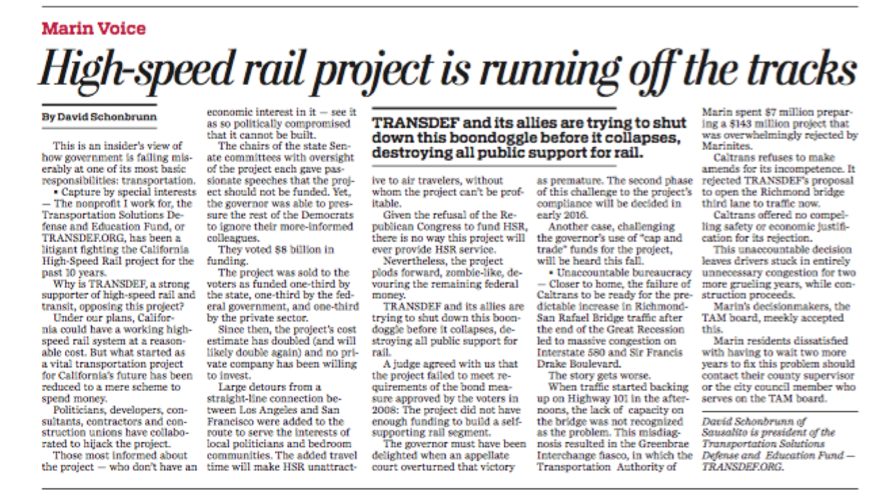Government Dysfunction
![]()
TRANSDEF
has observed vast amounts of government dysfunction in the
twenty-plus years of its existence. We offer this website
as a repository of efforts to change the direction of local
and regional government. The site is divided into these
sections:
High-Speed
Rail--What the
CA High-Speed Rail Authority (CHSRA) is doing wrong
Bay Area
Basics--What
the Metropolitan Transportation Commission (MTC) is
doing wrong
Regional
Planning--What
MTC and the counties are doing wrong
County-Level
Planning--What
counties are doing wrong
Agency
Dysfunction--We
offer a special page we call the Wall of Shame
Climate
Change--What
the CA Air Resources Board (ARB) is doing wrong
And of course, what these agencies are doing right, as well
as how to fix what they are doing wrong.
We offer this overview page in recognition of the
commonalities between these agencies in how they are
failing the public. In addition, this overview is needed to
see the interaction between these different levels of
government, which amplifies the dysfunction, rather than
correct it. Examples:
- MTC was a strong early supporter of the Pacheco Pass HSR route alternative, despite the Bay Area’s desperate need for transit infrastructure in the Altamont Pass (I-580) Corridor.
- MTC agreed to fund Caltrain electrification, despite the limit on future ridership expansion resulting from trading its surplus capacity to CHSRA.
- ARB willingly accepted MTC’s suggestion for a Bay Area Regional GHG Emissions Reduction Target that allowed the region to continue increasing its GHG emissions, contrary to the legislative intent of SB 375.
- MTC will fund just about anything that has the BART name attached to it, no matter how costly or foolish.
The issues here go deep--all the way to the heart of what Americans believe about their governments. The core tenet of democratic governance--that elected officials respond to the wishes of the people--must be deconstructed, to see thorough all the obfuscation. The American system of campaign finance has long meant that elected officials mostly act on behalf of their major contributors. At the federal level, this went from egregious to completely out-of-control after the Citizens United decision. At the local level, real estate developers have a large influence on decisions. At the state level, the history of the High-Speed Rail project shows that the route was designed to benefit developers. At the regional level, MTC’s decisions favor the interests of large consulting and construction firms. Cost-effectiveness--providing the greatest good for the greatest number--is simply not a consideration when projects are selected for funding there.
Besides making decisions that benefit private interests rather than do what is best for the overall public, governments deviate in other major ways from a democratic ideal. Americans do not take government seriously enough to provide the resources for policy makers to adequately prepare for the decisions before them. As part-timers, City Council Members, Commissioners, and Board members do not have the time to inform themselves about the issues they supposedly decide. They typically have full-time jobs, and many have appointed civic responsibilities as well.
That means that the actual decisionmaking is done largely at the staff level. While the sole purpose of policy-making boards is to provide an accountable independent review of staff work, independent thought is rare. Boards mostly rubber-stamp staff recommendations. Public meetings and hearings are theatrical performances that simulate policymaking, while the real decisions are made behind closed doors. The very idea of public input into decision-making tends to be a cruel hoax, raising the expectations of the powerless. (Note: while the public obviously influences some decisions, these tends to be at the margins, and are the exception rather than the rule.)

In 2015, the Bay Area’s most powerful dysfunctional agency, MTC, commenced a hostile takeover of its sister agency, the Association of Bay Area Governments (ABAG). Track the details of this process on the Merger page.